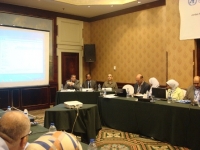 Surveillance in Jordan has been one of the Ministry of Health's success storiesThe Jordan Ministry of Health/Directorate of Communicable Diseases in collaboration with the World Health Organization, Jordan, and with the technical support of Centres for Disease Control and Prevention (CDC), jointly organized a three-day workshop in Amman on the pilot project “Jordan enhanced disease surveillance”.
Surveillance in Jordan has been one of the Ministry of Health's success storiesThe Jordan Ministry of Health/Directorate of Communicable Diseases in collaboration with the World Health Organization, Jordan, and with the technical support of Centres for Disease Control and Prevention (CDC), jointly organized a three-day workshop in Amman on the pilot project “Jordan enhanced disease surveillance”.
The workshop was attended by 45 people from the Ministry of Health, including: the head of departments of surveillance at directorate level, surveillance officers, public health officers, data entry support staff, and health inspectors from selected governorates.
Opening remarks were made by Dr Mohammad Abdallat, Director of Communicable Disease, MInistry of Health of Jordan, Dr Akram Eltom, WHO representative in Jordan and Dr Donald Shriber, Deputy Director CDC Center for Global Health’s Policy and Communication.
WHO Representative for Jordan, Dr Akram Eltom said that the Ministry of Health Jof ordan had one of the best health systems in the Region, with surveillance as one of its success stories. However, the current situation in Jordan with regards to the Syrian refugee crisis had meant new challenges to the surveillance system, challenges that the Ministry of Health were overcoming”. He also said that Jordan should always have regularly updated data and constantly explore opportunities for improvement.
The workshop was facilitated by the Ministry of Health, WHO Jordan, and the CDC with the collaboration of two participants from the East Mediterranean Public Health Network (Jordan). During these three days the status of the enhanced disease surveillance project and further plans for the implementation for the pilot project were discussed. The workshop was considered successful and provided an opportunity for a comprehensive sharing of views from different health sector partners. Participants discussed the best approaches to enhance the national surveillance system, and provide invaluable information to the new system. Further steps are planned to support health facilities that will implement enhanced disease surveillance.



